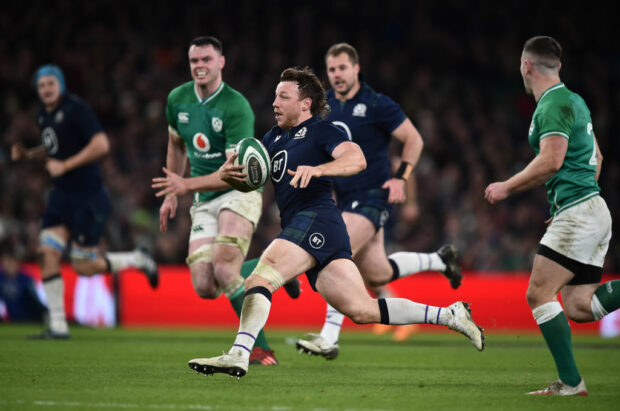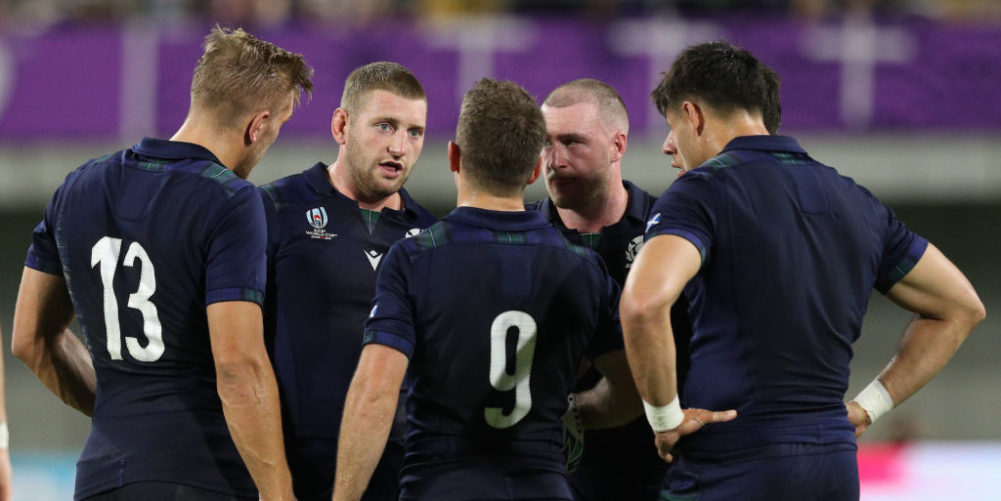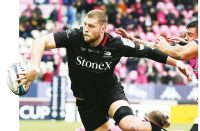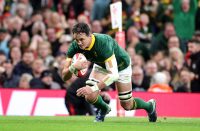GREIG Laidlaw is saying what any other player in his position would say by predicting that Scotland can win the Six Nations within the next two or three years.
The former Scottish captain is on his way to play in Japan after retiring from international rugby, and I don’t blame him for being an optimist, especially as he knows most of what there is to know about the current squad and coach Gregor Townsend, and will naturally back his team.
However, you have to take a realistic view and ask on what basis Laidlaw’s statement is based – and the answer is not a lot. Over the last decade, Scotland’s best Six Nations finish has been third, and, apart from beating Italy three times in Rome, their only other away win was against Ireland ten years ago.
In general, when opportunities to get to the top of the table have presented themselves, the Scots have not been able to do enough to be contenders. They have had their moments, but it has just not materialised, whether under Andy Robinson, Scott Johnson, Vern Cotter, or, so far, Townsend.
It is a given that if your 9 and 10 are not world class, then you will struggle, and Scotland have had neither a scrum-half nor a fly-half over that period who would be in the running for a World XV. Nothing much has changed this season, and even if Finn Russell had been available he would be very unlikely to get in ahead of Beauden Barrett, or even Owen Farrell and Johnny Sexton, while Ali Price will be hard pushed to get in to contention for the 2021 Lions squad at scrum-half.
This contrasts sharply with the 1990s when Scottish half-backs of the calibre of Gary Armstrong and Craig Chalmers would definitely have been in the World XV conversation. Gary was a warrior, and competing for the ball against an inspirational scrum-half like him was like taking on one of the world’s best back row forwards.
When you add Gavin and Scott Hastings, it was no surprise that the Scots had their fair share of Lions. Although selection was very much more political in those days, there is no doubt that Scotland had the talent to justify a strong representation.
Scotland’s position now is different, and their low numbers in Lions squads in 2009, 2013 and 2017 reflects their status in the Six Nations and European Cup – and even in the Pro14.
In 25 years the Scots have had only one European Cup semi-finalist (Edinburgh 2012), and two quarter-finalists (Glasgow 2017, 2019), while their sole PRO14 winner in eighteen attempts was Glasgow in 2015.
This does not reflect well for Lions selection, and nor do total player numbers of just over 36,000 in the entire country. It does not help having only two pro sides below international level in Edinburgh and Glasgow, whereas Wales have four and New Zealand five.
Until professionalism, you had all the Borders clubs where rugby was the community game. It was like having a mini New Zealand with great traditions, such as Melrose being the birthplace of the Sevens game – but that’s all in the past.
The SRU have come in for a lot of flak in recent years, including when Finn Russell’s father brought a successful unfair dismissal case against them after being axed from his position as Director of Domestic Rugby in 2017.
Since then it has been mixed, with Richard Cockerill doing reasonably well since arriving at Edinburgh, but Glasgow losing Kiwi coach Dave Rennie to the Wallabies.
Having watched the Six Nations closely for the last 20 years my feeling is that Townsend has his work cut out to take Scotland to the next level and challenge for the title.
A lot of people liked what Townsend’s predecessor Vern Cotter achieved, and he left the job having done well by almost taking them to the 2015 World Cup semi-finals. Gregor managed to raise Glasgow’s standard by winning a Pro14 title, and now he has to get Scotland to 8/10 in four games. That would help them to finish above third in the Six Nations, which would be enough of a success for Townsend to keep his job.
To do that he will have to resolve his ongoing difference of opinion with Finn Russell, who many consider to be a world-class 10, because you have to have your best players on the field to do well.
The Scots do have talented players, but not many are consistent. Huw Jones broke through with great fanfare at outside-centre, but then there was a big drop-off – and his defence is not always international class.
Stuart Hogg and Sean Maitland are usually very good performers for Scotland. It was a big decision for Townsend to make Hogg captain, because it is not easy to lead a side from an exposed position like full-back.
However, he rode out the criticism after dropping the ball over the line against Ireland, and not clearing his lines against England, to finish on a high note with the victory over France just before lockdown.
Hogg was also in fine form for Exeter, scoring a couple of great tries, and if a Lions side was picked right now he would arguably get into the Test starting team.
Despite that, he is not a nailed-on favourite, because there is fierce competition from Anthony Watson, Liam Williams and Jordan Larmour, and we know how much form and injury can change things in 12 months.
The Scottish back row put real pressure on opponents at times during the unfinished Six Nations, but I don’t see any of them as being renowned ball-carriers – which is what will be needed in South Africa.

Hamish Watson is quick and makes darting runs, and is a real nuisance as a ball winner and ball stopper, but he is not a heavy duty ball-carrier. Jamie Richie has got ability, he’s only 23, and at 6ft 4ins, he could become a good rangy, hard No.6 – but he will have to become the sort of unbreakable rock that Jerome Kaino was for New Zealand to become a genuine Lions bolter.
Magnus Bradbury is a another Scottish back rower with the physical size to impose himself, but he is a work in progress.
Elsewhere in the Scottish pack, we’ve known about Jonny Gray’s work ethic and durability for a long time, and with lock Scott Cummings and tight-head Zander Fagerson both under 25, there is potential.
In the backs, Adam Hastings did a good job in the Six Nations, but Russell is still the number one Scottish fly-half, while the back three of Maitland, Hogg and Blair Kinghorn are all Lions contenders at their best.
There are those in Scotland who feel that they have been short-changed by the Lions since Warren Gatland became coach, but that is not the case, because in every instance you could make a strong argument against a Scottish player being selected.
For example, Russell was only just making his mark three years ago, and even now Gatland is unlikely to be looking past Farrell at 10, even though Sexton will be hard pushed to last a series in South Africa.
If Russell is back playing for Scotland, he stands a chance of winning Lions selection.
Others in that boat are Hogg, Maitland, Gray and Ritchie – but for Scotland to be able to back their calls for greater Lions representation they will have to improve on a 25 per cent win ratio in the Six Nations over the last 20 years.























